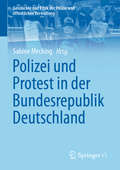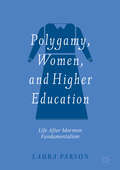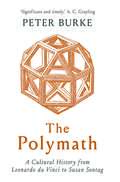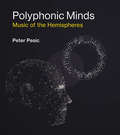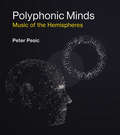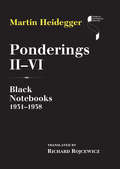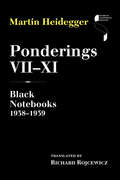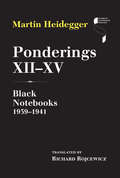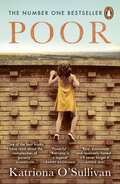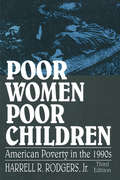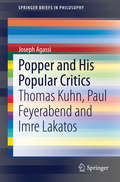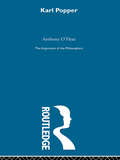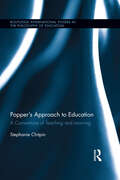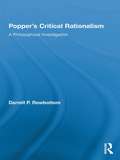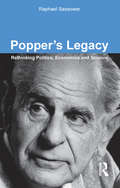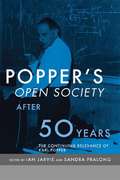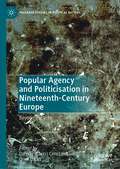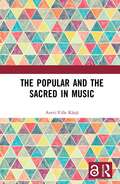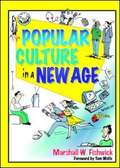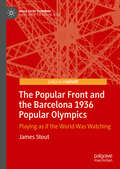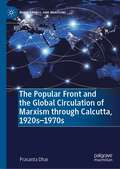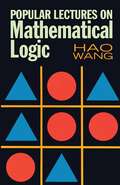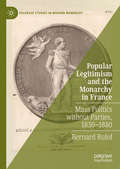- Table View
- List View
Politischer Extremismus: Eine Einführung (Elemente der Politik)
by Hans-Gerd JaschkeModerner politischer Extremismus hat viele Facetten: Linke und rechte Varianten, Islamismus, Fundamentalismus und Terrorismus. Der einführende Überblick informiert über diese Begriffe und ihre Hintergründe, über gegenwärtige Szenarien und mögliche künftige Entwicklungen. Auch die aktuelle sozialwissenschaftliche Debatte wird einbezogen. Alle Formen des politischen Extremismus sind Angriffe auf die liberale Verfassungs- und Gesellschaftsordnung. Im Mittelpunkt der Erklärung steht die Abspaltung der politischen Extremismen aus der historischen Konstellation von Liberalismus, Konservatismus und Sozialismus, wie sie sich im 19. und beginnenden 20. Jahrhundert entwickelt hat. Bei der Bekämpfung des Extremismus kann es nicht darum gehen, ihn zu beseitigen, sondern darum, ihn möglichst effektiv einzudämmen.
Polizei und Protest in der Bundesrepublik Deutschland (Geschichte und Ethik der Polizei und öffentlichen Verwaltung)
by Sabine MeckingDie Polizei als Vertreterin des staatlichen Gewaltmonopols gilt als Garantin für die öffentliche Sicherheit und Ordnung im Inneren eines Staates. Von jeher gehört damit das staatliche Protest-Management zu den zentralen Aufgaben der Polizei. Die Art und Weise, wie die Polizei hierbei vorgeht und der Bevölkerung gegenübertritt, gibt Einblicke in den inneren Zustand der Gesellschaft, die politische Verfasstheit und die Herrschaftsordnung des Landes. Der Blick auf die 70-jährige Geschichte der Bundesrepublik offenbart, dass sich sowohl die Inhalte und Formen des öffentlichen Protests als auch der polizeiliche Umgang damit mehrfach verändert haben. Polizeiliche und gesellschaftliche Entwicklungen, obgleich aufeinander bezogen, verlaufen dabei jedoch nicht selten versetzt und in unterschiedlichen Geschwindigkeiten.Prof. Dr. Sabine Mecking lehrt Landes- und Zeitgeschichte an der Philipps-Universität Marburg.
Polygamy, Women, and Higher Education: Life After Mormon Fundamentalism
by Laura ParsonThis volume explores the life stories of women who were former members of Mormon fundamentalist polygamous societies, from their own perspectives, to seek insight into their readiness for higher education settings. In order to support all learners in higher education, it is important to understand the unique needs of women students who have non-traditional formal schooling experiences and/or have come from restrictive or patriarchal cultures. This book helps further the discourse by providing recommendations for inclusive programs that consider how to develop elements of self-concept, empowerment, and motivation necessary for higher education success—academically and beyond.
The Polymath: A Cultural History from Leonardo da Vinci to Susan Sontag
by Peter BurkeThe first history of the western polymath, from the fifteenth century to the present day From Leonardo Da Vinci to John Dee and Comenius, from George Eliot to Oliver Sacks and Susan Sontag, polymaths have moved the frontiers of knowledge in countless ways. But history can be unkind to scholars with such encyclopaedic interests. All too often these individuals are remembered for just one part of their valuable achievements. In this engaging, erudite account, renowned cultural historian Peter Burke argues for a more rounded view. Identifying 500 western polymaths, Burke explores their wide-ranging successes and shows how their rise matched a rapid growth of knowledge in the age of the invention of printing, the discovery of the New World and the Scientific Revolution. It is only more recently that the further acceleration of knowledge has led to increased specialisation and to an environment that is less supportive of wide-ranging scholars and scientists. Spanning the Renaissance to the present day, Burke changes our understanding of this remarkable intellectual species.
Polyphonic Minds: Music of the Hemispheres
by Peter PesicPolyphony -- the interweaving of simultaneous sounds -- is a crucial aspect of music that has deep implications for how we understand the mind. In Polyphonic Minds, Peter Pesic examines the history and significance of "polyphonicity" -- of "many-voicedness" -- in human experience. Pesic presents the emergence of Western polyphony, its flowering, its horizons, and the perspective it offers on our own polyphonic brains. When we listen to polyphonic music, how is it that we can hear several different things at once? How does a single mind experience those things as a unity (a motet, a fugue) rather than an incoherent jumble? Pesic argues that polyphony raises fundamental issues for philosophy, theology, literature, psychology, and neuroscience -- all searching for the apparent unity of consciousness in the midst of multiple simultaneous experiences. After tracing the development of polyphony in Western music from ninth-century church music through the experimental compositions of Glenn Gould and John Cage, Pesic considers the analogous activity within the brain, the polyphonic "music of the hemispheres" that shapes brain states from sleep to awakening. He discusses how neuroscientists draw on concepts from polyphony to describe the "neural orchestra" of the brain. Pesic's story begins with ancient conceptions of God's mind and ends with the polyphonic personhood of the human brain and body. An enhanced e-book edition allows the sound examples to be played by a touch.
Polyphonic Minds: Music of the Hemispheres (The\mit Press Ser.)
by Peter PesicAn exploration of polyphony and the perspective it offers on our own polyphonic brains.Polyphony—the interweaving of simultaneous sounds—is a crucial aspect of music that has deep implications for how we understand the mind. In Polyphonic Minds, Peter Pesic examines the history and significance of “polyphonicity”—of “many-voicedness”—in human experience. Pesic presents the emergence of Western polyphony, its flowering, its horizons, and the perspective it offers on our own polyphonic brains. When we listen to polyphonic music, how is it that we can hear several different things at once? How does a single mind experience those things as a unity (a motet, a fugue) rather than an incoherent jumble? Pesic argues that polyphony raises fundamental issues for philosophy, theology, literature, psychology, and neuroscience—all searching for the apparent unity of consciousness in the midst of multiple simultaneous experiences. After tracing the development of polyphony in Western music from ninth-century church music through the experimental compositions of Glenn Gould and John Cage, Pesic considers the analogous activity within the brain, the polyphonic “music of the hemispheres” that shapes brain states from sleep to awakening. He discusses how neuroscientists draw on concepts from polyphony to describe the “neural orchestra” of the brain. Pesic's story begins with ancient conceptions of God's mind and ends with the polyphonic personhood of the human brain and body. An enhanced e-book edition allows the sound examples to be played by a touch.
Ponderings II–VI: Black Notebooks 1931–1938
by Martin Heidegger Richard RojcewiczPonderings II-VI begins the much-anticipated English translation of Martin Heidegger's "Black Notebooks." In a series of small notebooks with black covers, Heidegger confided sundry personal observations and ideas over the course of 40 years. The five notebooks in this volume were written between 1931 and 1938 and thus chronicle Heidegger's year as Rector of the University of Freiburg during the Nazi era. Published in German as volume 94 of the Complete Works, these challenging and fascinating journal entries shed light on Heidegger's philosophical development regarding his central question of what it means to be, but also on his relation to National Socialism and the revolutionary atmosphere of the 1930s in Germany. Readers previously familiar only with excerpts taken out of context may now determine for themselves whether the controversy and censure the "Black Notebooks" have received are deserved or not. This faithful translation by Richard Rojcewicz opens the texts in a way that captures their philosophical and political content while disentangling Heidegger's notoriously difficult language.
Ponderings VII–XI: Black Notebooks 1938–1939
by Richard Rojcewicz Martin HeideggerThrough these broad and sprawling notebooks, Heidegger offers fascinating opinions on Holderlin, Nietzsche, Wagner, Wittgenstein, Pascal, and many others. The importance of the Black Notebooks transcends Heidegger’s relationship with National Socialism. These personal notebooks contain reflections on technology, art, Christianity, the history of philosophy, and Heidegger's attempt to move beyond that history into another beginning.
Ponderings XII–XV: Black Notebooks 1939–1941
by Martin Heidegger Richard RojcewiczPonderings XII–XV is third in a series of four "Black Notebooks" which Martin Heidegger composed in the early years of World War II. As always with Heidegger, the thoughts expressed here are not superficial reflections on current events, but instead penetrate deeply into them in order to contemplate their historical importance. Throughout his ponderings, Heidegger meditates on the call for an antidote to the rampant technological attitude which views all things with a dismissive consumer mentality. Although this volume caused quite a scandal when originally published in German due to references to World-Judaism, English readers with access to the full text can now judge for themselves what Heidegger means in his use of that term. In style, this notebook is less aphoristic and more sustained than the previous ones, but remains probing, challenging, and fascinating.
Poor: Grit, courage, and the life-changing value of self-belief
by Katriona O'SullivanThe No. 1 BestsellerBiography of the Year, Irish Book Awards 2023The Last Word Listeners' Choice Award, Irish Book Awards 2023'One of the best [books] I have read about the complexities of poverty . . . one of the most remarkable people you will ever meet' GuardianLike young girls everywhere Katriona O’Sullivan grew up bright, enthusiastic, curious. But she was also surrounded by abject poverty and chaos, and after she became pregnant and homeless at 15, what followed was five years of barely surviving. Yet today Katriona is an award-winning academic whose work explores barriers to education for girls like her.What set Katriona on this unexpected path were the mentors and supporters who truly saw her. The teachers who showed her how to wash in the school toilets or turned up at her door to convince her to sit at least one GCSE. The community worker who encouraged her to apply for training schemes. The friend who introduced Katriona to Trinity College’s access program while she was a cleaner. Simple acts that would help her turn her life around.Told with warmth, clarity and compassion – compassion for her parents, for her younger self, for others – Poor is both an astonishing personal testimony and an impassioned plea for the future of our children. ‘Powerful – Katriona is a legend’ Barry Keoghan‘Raw, passionate and resolutely honest – I’ll never forget it’ Annie Mac'Full of insight . . . so important' Fi Glover, Times Radio 'I read poor in one sitting I found it so compelling . . . moving, uplifting, brave, heroic' Nuala McGovern, Woman's Hour, BBC Radio Four'Moving, funny, brave and original - just like the author . . . absolutely incredible' Roísín Ingle, Irish Times Women's Podcast‘One of the books of the year’ Patrick Kielty, Late Late Show, RTÉ One'One of the most important books I have ever read … a beautiful telling of determination despite the odds' Lynn Ruane, Irish Times 'Fearless, funny and searingly honest' Adil Ray OBE'Raw and remarkable' Irish Independent 'A book of empowerment and hope' Patricia Scanlan ‘Remarkable . . . a vivid retelling of Katriona flourishing, despite her beginnings’ BBC News West Midlands
Poor Women, Poor Children: American Poverty in the 1990s
by RodgersThis work presents the most recent data on poverty, family structure and participation in welfare programmes. It analyses the causes for the continuing rise in female-headed households, the high rates of poverty among such families, and evaluates past, present and future reform policies.
Popper and His Popular Critics
by Joseph AgassiThis volume examines Popper's philosophy by analyzing the criticism of his most popular critics: Thomas Kuhn, Paul Feyerabend and Imre Lakatos. They all followed his rejection of the traditional view of science as inductive. Starting from the assumption that Hume's criticism of induction is valid, the book explores the central criticism and objections that these three critics have raised Their objections have met with great success, are significant and deserve paraphrase. One also may consider them reasonable protests against Popper's high standards rather than fundamental criticisms of his philosophy The book starts out with a preliminary discussion of some central background material and essentials of Popper's philosophy. It ends with nutshell representations of the philosophies of Popper. Kuhn, Feyerabend and Lakatos. The middle section of the book presents the connection between these philosophers and explains what their central ideas consists of, what the critical arguments are, how they presented them, and how valid they are. In the process, the author claims that Popper's popular critics used against him arguments that he had invented (and answered) without saying so. They differ from him mainly in that they demanded of all criticism that it should be constructive: do not stop believing a refuted theory unless there is a better alternative to it. Popper hardly ever discussed belief, delegating its study to psychology proper; he usually discussed only objective knowledge, knowledge that is public and thus open to public scrutiny.
Popper-Arg Philosophers
by Anthony O'HearFirst Published in 1999. Routledge is an imprint of Taylor & Francis, an informa company.
Popper, Otto Selz, and the Rise of Evolutionary Epistemology
by Michel Ter HarkThis book demonstrates that Karl Popper's philosophy of science, with its emphasis on the method of trial and error, is largely based on the psychology of Otto Selz. Selz's theory of problem solving and scientific discovery laid the foundation for much of contemporary cognitive psychology. This original analysis covers Popper's early writings before he began his career as a philosopher.
Popper's Approach to Education: A Cornerstone of Teaching and Learning (Routledge International Studies in the Philosophy of Education #38)
by Stephanie ChitpinChallenging the theory of induction in teacher education, this book proposes a knowledge-building framework based on the critical rationalism of philosopher of science, Karl Popper. The Objective Knowledge Growth Framework developed in this book is designed to be an effective critical analysis framework for empowering teachers and schools to build and share professional knowledge. This book is essential reading for educational scholars, researchers, professionals, policymakers, and all those interested in exploring the application of Popperian philosophy to the field of education and re-envisioning educational practice.
Popper's Critical Rationalism: A Philosophical Investigation (Routledge Studies in the Philosophy of Science)
by Darrell RowbottomPopper’s Critical Rationalism presents Popper’s views on science, knowledge, and inquiry, and examines the significance and tenability of these in light of recent developments in philosophy of science, philosophy of probability, and epistemology. It develops a fresh and novel philosophical position on science, which employs key insights from Popper while rejecting other elements of his philosophy. Central theses include: Crucial questions about scientific method arise at the level of the group, rather than that of the individual. Although criticism is vital for science, dogmatism is important too. Belief in scientific theories is permissible even in the absence of evidence in their favour. The aim of science is to eliminate false theories. Critical rationalism can be understood as a form of virtue epistemology
Popper's Legacy: Rethinking Politics, Economics and Science
by Raphael SassowerThe work of Karl Popper has had extraordinary influence across the fields of scientific and social thought. Widely regarded as one of the greatest philosophers of science of the twentieth century, he was also a highly influential social and political philosopher, a proponent and defender of the "open society". "Popper's Legacy" examines Popper in the round, analysing in particular his moral and psychological insights. Once Popper's scientific legacy is couched in political and moral terms, it becomes apparent that his concern for individual autonomy does not come at the expense of institutional guidelines and social conventions. Instead, these guidelines turn out to be essential sanctions for individual freedom. Popper envisions the conduct of the scientific community as paralleling the conduct of any democratically established community. Critical rationality guides the words and actions of all participants and leadership can be replaced without violence. In presenting a critical overview, "Popper's Legacy" reveals the debt many intellectual movements - such as Marxism, feminism, and postmodernism - still owe to Popper.
Popper's Open Society After Fifty Years
by Ian Jarvie Sandra PralongPopper's Open Society After Fifty Years presents a coherent survey of the reception and influence of Karl Popper's masterpiece The Open Society and its Enemies over the fifty years since its publication in 1945, as well as applying some of its principles to the context of modern Eastern Europe.This unique volume contains papers by many of Popper's contemporaries and friends, including such luminaries as Ernst Gombrich, in his paper 'The Open Society and its Enemies: Remembering its Publication Fifty Years Ago'.
Popular Agency and Politicisation in Nineteenth-Century Europe: Beyond the Vote (Palgrave Studies in Political History)
by Diego Palacios Cerezales Oriol LujánThis book provides an entry point to the most cutting-edge lines of research on popular political mobilisation in Europe. It brings together leading scholars from Germany, France, Britain, the Netherlands and Spain. The chapters explore the connected dimensions of popular participation within different countries and across borders, covering the topics of iconoclasm, popular acclamations, street politics, associations, petitions and electoral agitation. Focusing on the role of disenfranchised citizens and women, this collection broadens the themes of traditional political historical research that has identified political participation with the right to vote and struggles for political inclusion, and brings a wide array of formal and informal political practices to the centre of nineteenth-century European life. A must-read for scholars, undergraduates, and graduate students wishing to explore multiple dimensions of the history of political engagement and politicisation.
The Popular and the Sacred in Music
by Antti-Ville KärjäMusic, as the form of art whose name derives from ancient myths, is often thought of as pure symbolic expression and associated with transcendence. Music is also a universal phenomenon and thus a profound marker of humanity. These features make music a sphere of activity where sacred and popular qualities intersect and amalgamate. In an era characterised by postsecular and postcolonial processes of religious change, re-enchantment and alternative spiritualities, the intersections of the popular and the sacred in music have become increasingly multifarious. In the book, the cultural dynamics at stake are approached by stressing the extended and multiple dimensions of the sacred and the popular, hence challenging conventional, taken-for-granted and rigid conceptualisations of both popular music and sacred music. At issue are the cultural politics of labelling music as either popular or sacred, and the disciplinary and theoretical implications of such labelling. Instead of focussing on specific genres of popular music or types of religious music, consideration centres on interrogating musical situations where a distinction between the popular and the sacred is misleading, futile and even impossible. The topic is discussed in relation to a diversity of belief systems and different repertoires of music, including classical, folk and jazz, by considering such themes as origin myths, autonomy, ingenuity and stardom, authenticity, moral ambiguity, subcultural sensibilities and political ideologies.
Popular Culture in a New Age
by Marshall William FishwickFishwick (interdisciplinary studies, American studies, and popular culture studies, Virginia Tech) offers observations on popular culture in view of the changes brought about by the information revolution and the digital divide. Coverage hops about to address issues such as the millennium; distinctions between folk, fake, and pop; sacred symbols; the cult of celebrity; war; postmodern pop; and the concept of the global village, among other topics. Includes a couple of contributions by graduate students with similar snappy, stream-of-consciousness approaches.
The Popular Front and the Barcelona 1936 Popular Olympics: Playing as if the World Was Watching (Mega Event Planning)
by James StoutThis book deals with the events leading up to the 1936 Popular Olympics which would have united the Popular Front in opposition to the Berlin Olympics. It also discusses the days after the outbreak of the Spanish Civil War which began on the same day the games were due to start. Using a variety of primary and secondary sources, the book traces the biographies of several Popular Olympians who would go on to volunteer in the Spanish Civil War. The book also examines the planned events and locations for the Popular Olympics as well as the international funding that the games secured. The book argues that the events were a departure from Workers’ Sport as well as the IOC’s Olympic games and represented an important cultural manifestation of the Popular Front.
The Popular Front and the Global Circulation of Marxism through Calcutta, 1920s-1970s (Marx, Engels, and Marxisms)
by Prasanta DharThis book examines the global circulation of Marxism seen from one of its most highly charged sites: Calcutta in India. Building on but also revising existing approaches to global intellectual history, the book presents the circulation of Marxism through Calcutta as a historically-sited problem of mass mediation. Using tools from media studies, the book explores the way that Marxism was presented to the public, the technologies used, and the meanings of Marxism in twentieth-century Calcutta. Demonstrating how the Popular Front was split between the so-called 'people's group' and those whom were called 'intellectuals', the book argues that the people's group generally identified themselves as Marxists and preferred audio-visual media such as theatre, while the so-called intellectuals privileged academic rigour and print media, usually referring to themselves as Marxians. Thus, the author reveals a polyphony of Marxisms in the Popular Front. Tracing Marxism back to the Bengal Renaissance and the Swadeshi and Naxal movements, this book shows how debate around the meaning of 'Marxism' continued throughout the 1970s in Calcutta, and eventually engendered the historiographical movement that has come to be known as Subaltern Studies.
Popular Lectures on Mathematical Logic
by Hao WangA noted logician and philosopher addresses various forms of mathematical logic, discussing both theoretical underpinnings and practical applications. Author Hao Wang surveys the central concepts and theories of the discipline in a historical and developmental context, and then focuses on the four principal domains of contemporary mathematical logic: set theory, model theory, recursion theory and constructivism, and proof theory.Topics include the place of problems in the development of theories of logic and logic's relation to computer science. Specific attention is given to Gödel's incompleteness theorems, predicate logic and its decision and reduction problems, constructibility and Cantor's continuum hypothesis, proof theory and Hilbert's program, hierarchies and unification, proof of the four-color problem, the Diophantine problem, the tautology problem, and many other subjects. Three helpful Appendixes conclude the text.
Popular Legitimism and the Monarchy in France: Mass Politics without Parties, 1830–1880 (Palgrave Studies in Modern Monarchy)
by Bernard RulofThis book explores mid-nineteenth-century French legitimism and the implications of popular support for a movement that has traditionally been portrayed as an aristocratic force intent on restoring the Old Regime. This type of monarchism has often been understood as a form of elitist patronage politics or, alternatively, identified with ultramontane Catholicism. Although historians have offered a more nuanced view in the last few decades, their work, nevertheless, has predominantly focused on legitimist leaders rather than their followers and their professed feelings of loyalty to monarchy and monarch. This book’s originality therefore is twofold: firstly as an analysis of popular rather than élite monarchism; and secondly, as a study which portrays this form of royalism as a political movement characteristic of a period which saw the emergence of mass politics, while parties were still non-existent. It not only discusses the social and cultural settings of (popular) monarchism, but also contributes to the history of political parties, citizenship and democracy.

